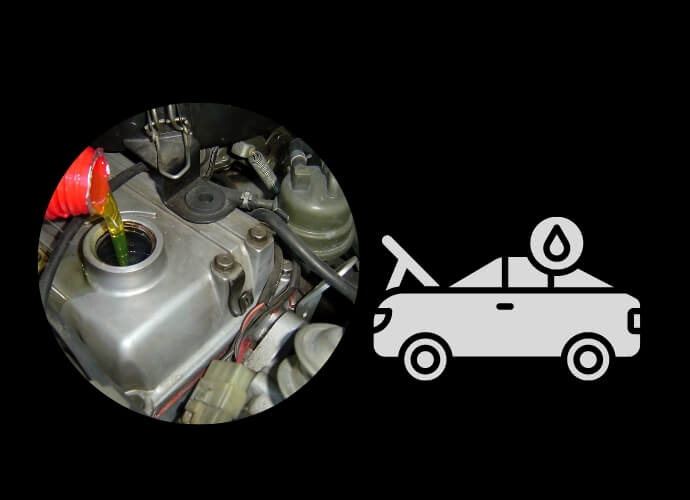Motor oil is one of the most critical components of a car’s engine. It acts as a lubricant that reduces friction, minimizes wear and tear, and maintains a car’s engine temperature at an optimal level.

The type of oil you use, the frequency of oil changes, and how you add oil to your car are all essential factors to keep in mind. In this article, we will answer the question, “Can I just pour new oil into my car?”
Why is Changing Oil Important for Your Car?
The oil in your car is responsible for lubricating the engine and preventing damage to internal parts. Over time, the oil becomes contaminated with dirt, debris, and metal particles, reducing its effectiveness. Changing the oil regularly helps maintain the health of the engine and prolongs its lifespan.
Regularly changing your oil can improve the life of your engine and help you avoid costly repairs down the road.
How to Check Your Oil Level?
The first step to changing your oil is to determine how much oil is in your car’s engine. You can do this by checking the oil level with a dipstick. The dipstick is usually located near the oil filler cap, under the hood.
To check the oil level, pull out the dipstick, wipe it clean, insert it back into the engine, and then pull it out again. The oil level should be between the two markers on the dipstick.
How to Change Your Oil?
If you have determined that your oil level is low, it’s time to change your oil. Before you begin, make sure you have all the necessary supplies, including a new oil filter, a new oil drain plug gasket, and a container to catch the old oil.
Are you experiencing a shaking sensation when accelerating your car? If so, you may be wondering what the cause could be. Low oil levels can be the culprit behind this shaking.

- Locate the oil drain plug under your car, and place the container under it to catch the old oil.
- Remove the drain plug using a wrench, and let the old oil drain into the container.
- Replace the drain plug with a new gasket and tighten it securely.
- Locate the oil filter, usually near the oil pan, and remove it using an oil filter wrench.
- Install the new oil filter and tighten it securely.
- Pour the new oil into the engine, checking the oil level regularly with a dipstick until it reaches the correct level.
- Replace the oil filler cap and start the engine to circulate the oil.
- Check for leaks and check the oil level again after the engine has been running for a few minutes.
Can I Just Pour New Oil into My Car?
Now, to answer the question, “Can I just pour new oil into my car?” The answer is no, you cannot just pour new oil into your car without changing the old oil first.
The old oil must be drained, and the oil filter must be changed to ensure that the new oil will be able to circulate and provide adequate lubrication.
The Importance of Choosing the Right Motor Oil
The type of oil you use is also essential for the health of your engine. Your car’s manufacturer will specify the type of oil that is recommended for your car.
There are several types of motor oil available, including conventional, synthetic, and high-mileage oil. It’s essential to choose the right type of oil for your car to ensure optimal performance and longevity.
The Consequences of Neglecting Oil Changes
Neglecting oil changes can have serious consequences for your engine. If you don’t change your oil regularly, the oil can become contaminated with dirt and debris, reducing its ability to lubricate your engine.
Over time, this can cause wear and tear on your engine, leading to costly repairs. Neglecting oil changes can also reduce fuel efficiency and increase emissions, costing you more at the pump and harming the environment.
Conclusion
Changing your oil regularly is essential to the health of your engine. It’s important to check your oil level regularly, use the right type of oil, and change your oil at the manufacturer’s recommended intervals.
Pouring new oil into your car without changing the old oil first is not recommended and can cause damage to your engine. Regular oil changes can extend the life of your engine, improve fuel efficiency, and reduce emissions.
Common Questions & Response
How Often Should I Change My Oil?
The frequency of oil changes depends on the manufacturer’s recommendations and driving conditions. As a general rule, it’s recommended to change your oil every 3,000 miles or three months, whichever comes first.
What Happens if I Don’t Change My Oil?
Neglecting oil changes can cause your engine oil to become contaminated, leading to increased wear and tear, reduced fuel efficiency, and increased emissions. Over time, this can cause significant damage to your engine, leading to costly repairs.
Can I Change My Own Oil?
Yes, you can change your own oil. It’s a relatively simple process, and all the necessary supplies can be purchased at an auto parts store. Make sure to follow the manufacturer’s recommendations for the type of oil to use and the frequency of oil changes.
How Much Oil Do I Need for an Oil Change?
The amount of oil you need for an oil change depends on your car’s engine size. Refer to your owner’s manual or check with an auto parts store for the recommended amount of oil for your specific car.
Can I Use Synthetic Oil Instead of Conventional Oil?
Yes, you can use synthetic oil instead of conventional oil. Synthetic oil is a better choice for high-performance or high-mileage engines, as it provides better protection and performance. However, it’s important to follow the manufacturer’s recommendations and use the type of oil specified for your car.
